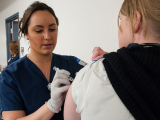Oct 5, 2012
UK ranks low in non-drug 2009 H1N1 protective steps
People in Great Britain lagged substantially behind those in other countries in taking non-drug prevention steps during the 2009 H1N1 influenza pandemic, according to a study today in Lancet Infectious Diseases. US researchers conducted phone interview of 900 people each in Britain, Argentina, Mexico, and Japan, as well as 911 people in the United States. They found that only 25% of UK respondents coughed or sneezed into their elbow or shoulder more frequently (compared with 84% in Argentina, 82% in Mexico, 55% in the US, and 33% in Japan). Rates for more frequent hand washing and covering of coughs and sneezes were, respectively: UK, 53%, 29%; Argentina, 89%, 64%; Mexico, 86%, 77%; US, 72%, 61%; and Japan, 72%, 48%. The pattern of low UK rates also held for social-distancing behaviors such as avoiding contact with individuals, avoiding crowds, and avoiding travel. The researchers added, however, "These non-pharmaceutical behaviours did not reduce the likelihood of getting vaccinated in any country." The rate of flu-vaccine uptake, though, was low in all the countries: Mexico, 33%; US, 27%; Japan, 25%; UK, 19%; and Argentina, 16%.
Oct 5 Lancet Infect Dis abstract
ECDC report explores flu vaccine for kids, pregnant women
The European Centre for Disease Prevention and Control (ECDC) yesterday published a technical report that explores various approaches to targeting children for flu vaccination, as well as the evidence supporting flu vaccination in pregnant women. The report comes down most favorably for targeted immunization of kids with risk factors and for vaccinating pregnant women who have no known contraindications. The systematic review analyzed data on the burden of seasonal and pandemic flu and on the safety, efficacy, effectiveness, and cost-effectiveness of seasonal and pandemic flu vaccines in these populations. The agency does not deliver hard-and-fast recommendations but instead lists pros and cons for (1) universal vaccination of all children 6 months to 18 years old, (2) universal vaccination of children 6 months to 4 years old, (3) targeted immunization of kids 6 months to 18 years old with risk factors, and (4) annual flu vaccination for all pregnant women who don't have contraindications. The report provides a detailed analysis of each approach, including gaps in the existing data, but lists no cons to the targeted approach to children with risk factors. The only con listed for pregnant women is a lack of data specifically for European women.
Oct 4 ECDC technical report
Oct 4 ECDC press release
CDC reports no new variant H3N2 cases
No new variant H3N2 influenza infections were reported last week, keeping the national total at 306, the US Centers for Disease Control and Prevention (CDC) said today in its weekly influenza update. Most cases occurred after prolonged swine exposure, and though some instances of likely human-to-human spread have been reported, no sustained transmission has been seen. Markers of seasonal flu activity were at levels normal for this time year. Deaths from pneumonia and flu were slightly above the seasonal baseline but below the epidemic threshold, and no pediatric flu deaths were reported, keeping the total at 34 for the 2011-2012 season. On Oct 12 the CDC will resume posting its more extended weekly flu reports, according to a note posted in May on its situation update weekly summary Web page.
Oct 5 CDC weekly flu update

















